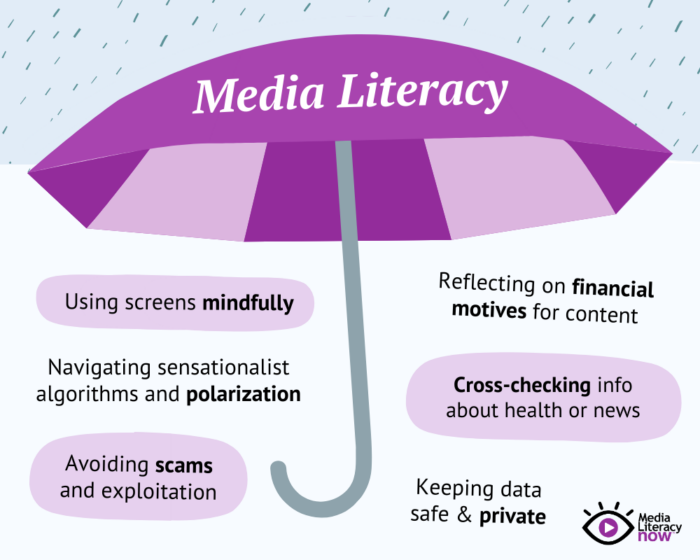How Libraries Can Support Media Literacy
I recently shared my suspicions about the consequences of a lack of media literacy. The critical skills that allow people to apply context, curiosity, and proof of validity when consuming information have never been more important. A quote from Sam Wineburg, PhD bears repeating:
I’ve come to believe that reliable information is to civic health what clean water and proper sanitation are to public health. Never has so much information been at our fingertips as it is today. Whether this bounty will make us smarter and better informed or more ignorant and narrow-minded will depend on one thing: our educational response to this challenge.
What better place to start than the library? Whether it’s through the school or the public library system, there is a wealth of information available to help learners of all ages, and it falls to librarians to make these resources easy to find and navigate.
This might look like writing lessons into the scope and sequence of curriculum for a school librarian or offering media literacy workshops at your branch of the public library. Any website associated with a library can have a page dedicated to fact-checking resources where patrons could get a reliable answer quickly. Modeling the use of these resources is the number one key to making checking your sources a knee-jerk reaction. Media literacy is worth nothing if it’s not sparked by curiosity, and the desire to answer the question “how do you know?”
Transform your reading experience! Become an All Access member and unlock a treasure trove of exclusive content—must-read articles, deep dives, and curated recommendations—with unlimited access to 20+ members-only newsletters, community features, and more. Sign up now for only $6/month!
Below, I’ve gathered resources that can be used across many venues and age ranges. In the right hands and with the right emphasis, these are valuable tools to help people in the pursuit of validity. Whether you’re teaching adults to read laterally, high school students to cite their sources, or younger children to resist believing everything they see, there are websites and organizations below that can support librarians and teachers in their righteous quest to raise media literacy skills.
 Image from Media Literacy Now Image from Media Literacy Now |
Media Literacy Resources
Quick Use
These are sites that people could have ready to check things as they go about their day or to look up information on a single issue.
AllSides: Analyzes news stories by sharing information from sources skewing left, right, and center on the political spectrum.
Google Fact Check Tools: Aggregates recent fact checks from around the internet.
FactCheck.org: Meticulously fact-checks all things US politics
Snopes: A classic for a reason, Snopes specifically checks on popular memes, urban legends, and internet rumors.
Lead Stories: Similar to Snopes, Lead Stories tackles current rumors. The tagline “Just because it’s trending doesn’t mean it’s true,” really sums it up.
Lesson Plans
These links and resources can help teachers or people leading workshops teach media literacy skills.
AI Literacy Lessons for Grade 6-12: From Common Sense Education, these quick, grab-and-go lessons are short and impactful, with links to a lot more training available for teachers.
Essential News and Media Literacy Skills for Students: Another resource from the fabulous Common Sense Education, these resources focus on helping students analyze media and fight misinformation.
Checkology: From the News Literacy Project, this e-learning platform guides learners through lessons that encourage them to identify credible sources and engage with news media through a critical thinking lens.
Be Media Wise: From PBS, this collection of lessons uses kid voices to impart media literacy lessons.
Is That Story Newsworthy?: From NPR’s Public Editor, this Educator’s Edition helps journalism students recognize why a story would be important to cover. Interestingly, there is valuable self-reflection on NPR stories in this piece.
How To Critically Read A Press Release from the Federal Government: This amazing piece is written by Book Riot’s own Kelly Jensen, and it has actionable steps for using literacy skills and context to understand what is truly being said.
Civic Online Reasoning: Free, classroom-ready materials that provide a huge impact whether you use a single lesson or download the whole curriculum.
Organizations and Reports
These professional organizations and reports on the state of media literacy are valuable for continuing education and for use in advocating for media literacy support.
Hopefully, you’ve found at least one website or lesson that excites you. Personally, in researching these resources, I joined at least one organization and earmarked several lessons that I wanted to adapt for my elementary students right away. There isn’t a lack of free and comprehensive resources, so now it falls to us, the librarians, to take this bounty and get it to our patrons as quickly as possible.
Let’s tip our hat to Levar Burton and bring back “but you don’t have to take my word for it.” Encourage everyone to check their sources and watch media literacy rates rise!
Copyright
© Book Riot
